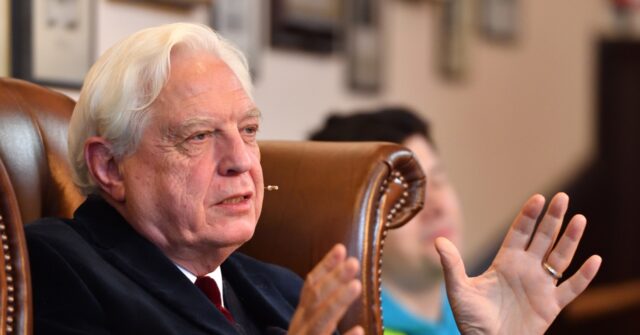BBC World Affairs Editor John Simpson has faced severe backlash after characterizing the fleeing Syrian dictator Bashar al-Assad as “weak rather than wicked.” Simpson, who has been a journalist at the BBC since 1970, expressed these sentiments following Assad’s recent flight to Russia amidst the collapse of his regime. This portrayal of Assad has drawn ire from various observers who question Simpson’s understanding of the complexities of Assad’s rule and the totalitarian nature of his governance. The description of Assad’s character as “meek” and “anxious to please” has been met with incredulity, especially considering the dictator’s notorious history of violence and oppression.
Simpson’s comments were made on social media platform X, where he suggested that Assad was merely a puppet who acted under the influence of external powers, specifically Russia and Iran, rather than embodying the malicious traits typically seen in tyrannical leaders. His assertion that Assad is the “reverse of the traditional dictator” prompted immediate criticism, with users mocking his insights and questioning his perceived naiveté. Critics highlighted the dissonance between Simpson’s characterization and the documented abuses perpetrated by Assad’s regime, which has included the use of chemical weapons against civilians and the systematic elimination of dissent.
In light of Simpson’s remarks, many users added their own responses, pointing out the extent of al-Assad’s atrocities over his decade-long reign during the Syrian civil war. Despite Assad’s claims to legitimacy, he has been widely recognized as one of the world’s most brutal autocrats. His regime has been responsible for the deaths of hundreds of thousands and the displacement of millions, a stark contrast to the image of a well-meaning leader that Simpson seemed to portray. The notion that Assad’s actions were uncharacteristically inadequate for a dictator is seen by some as an oversimplification of a deeply entrenched and violent political situation.
The situation escalated over the weekend when al-Assad reportedly fled Syria, seeking refuge in Russia, a move that signifies the precipitating collapse of his long-standing authoritarian rule. Following the Syrian civil war, which began during the Arab Spring in 2011, Assad’s hold on power had been tenuous. However, significant military support from Russia and Iran had allowed him to maintain a grip on power despite widespread international condemnation. The Kremlin’s subsequent announcement granting political asylum to Assad reflects the complexities of international relations and highlights the alliances formed between authoritarian regimes.
The Kremlin, currently under the leadership of President Vladimir Putin, has not remained silent on the matter, with spokesperson Dmitry Peskov confirming that political asylum has been granted, while also withholding detailed comments about Assad’s present condition or location. This move not only underscores Russia’s pivotal role in backing Assad throughout the years but also its willingness to harbor leaders who have been unrepentant in their violent acts against their own people. The equation of support by such powerful allies has perpetuated Assad’s tyranny, complicating the efforts of those seeking redress for human rights abuses in Syria.
The uproar surrounding John Simpson’s comments ultimately reflects a broader frustration with how some media figures present narratives about authoritarian leaders. It raises pivotal questions about the responsibilities of journalists to accurately convey the realities of oppressive regimes and the consequences of their portrayal. While Assad may indeed display certain behaviors that could be perceived as meek in personal encounters, such characterizations risk undermining the grave realities of the suffering inflicted under his leadership. As the world confronts the aftermath of Assad’s rule, discourse surrounding his legacy—and the implications of such commentary by established journalists—will continue to shape public understanding and response to authoritarianism.

